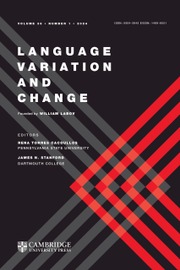Article contents
Defining the envelope of linguistic variation: The case of “don't count” forms in the copula analysis of African American Vernacular English
Published online by Cambridge University Press: 12 June 2009
Abstract
Ever since Labov, Cohen, Robbins, and Lewis's (1968) pioneering study, it has been commonplace to set aside certain tokens in analyzing variability in the English copula as “don't count” (DC) forms. These cases are most often occurrences of the copula that exhibit categorical behavior (as with the full copula in clause-final position), as well as those that are ambiguous or indeterminate. In this article, I propose a set of copula forms that should be set aside from variable analysis as instances of DC forms to allow for systematic comparisons among studies. I review the major alternative descriptions of DC copula cases in the literature and analyze the behavior of the traditional DC categories. New data are presented to support the exclusion of particular DC cases from analyses of copula variability. Among the conclusions are that [was], [thas], and [is] should be excluded from quantitative analyses of variation in the copula because of their invariant status, and that a number of tokens commonly included (e.g., questions) should be excluded on various grounds.
- Type
- Research Article
- Information
- Copyright
- Copyright © Cambridge University Press 1997
References
REFERENCES
- 47
- Cited by


